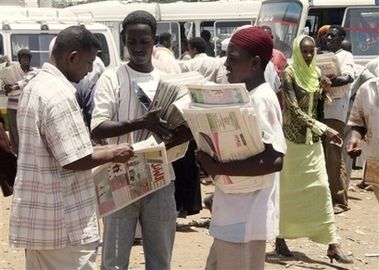Media watchdog slams newspapers for withholding pay from banned journalists
November 7, 2013 (KHARTOUM) – Sudan’s Journalists’ Association for Human Rights (JAHR) has condemned intentions of some newspapers to suspend salaries of the journalists who are banned from writing by a decision from the National Intelligence and Security Services (NISS).

Newspaper publishers justify the move by saying that they have nothing to do with NISS’s decisions, pointing out that the suspended journalist or writer not the newspaper should bear financial losses resulting from the ban.
Sudanese journalists work under tight daily censorship controls exercised by NISS.
The NISS recently intensified its crackdown on press in the country, introducing tough new measures to prevent media outlets from covering recent anti-government protests, which erupted last September following the lifting of subsidies on fuel.
Jahr said that Al-Ahram Al-Youm daily newspaper has suspended the salary of the columnist Osman Shabona for the month of October following NISS’s decision the month before to ban him from writing.
Shabona asserts that he has not received his salary and said that this is part of the practices of the repressive regime, and has asked why NISS does not take legal action if he has done anything wrong.
NISS confiscated October 24 and 25 issues of Al-Taghyeer newspaper and suspended its October 26 issue. It also confiscated October 30 2013 issue of Elaph, a weekly business newspaper.
NISS also arrested journalist Mohamed Ali Mohamado who works for Al-Akhbar newspaper since September 28 until today.
Jahr said that it rejects NISS’s practices that violate freedoms of opinion, expression, and publication, saying that courts lack the basic standards for fair trial.
Among the journalists and writers who are currently on trial are novelist Rania Mamoun, journalist Buhram Abdel-Moneimr who works for al-Youm al-Tali newspaper, and journalist Khalid Ahmed who works for al-Sudani newspaper.
It considered the suspension of salaries of the banned journalists unjust, and said that newspapers and publishers must take a clear and strong stance against NISS, pointing that complicity with NISS is a crime that is not less than the one committed by NISS against journalists.
Jahr also condemned NISS’s banning decisions which affected large number of columnists and journalists including Khalid Fadl, Amal Habani, Zuhair Al-Saraj, Isam Jaafar, Rasha Awad, Abu zar Ali Al-Amin, Al-Taher Abu Jawhara, Faiz Al-silaik, Mujahid Abdallah, Ashraf Abdel-Aziz, Salah Auwoda, Al-Tayeb Zain Al-Alabdeen, Mohamed Zain Al-Abdeen, Siddiq Al-Ansari, Mohamed Osman Ibrahim, Al-Nour Ahmed Al-Nour, Mohamed Abdel-Majid, Osman Shabona, Shamail Al-Nour, Haider Al-Makashfi, Al-Tahir Satti, and Hassan Ismail.
The ban on some of the above mentioned columnists and journalists has been lifted while others are still suspended.
(ST)
